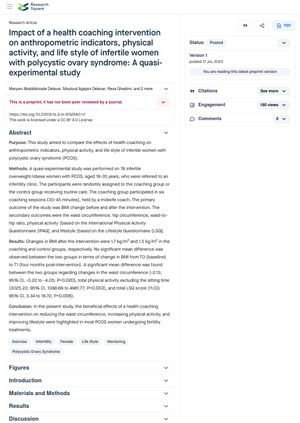Impact of Health Coaching Intervention on Anthropometric Indicators, Physical Activity, and Lifestyle of Infertile Women With Polycystic Ovary Syndrome: A Quasi-Experimental Study
July 2023
in “
Research Square (Research Square)
”

TLDR Health coaching helped reduce waist size, increase physical activity, and improve lifestyle in overweight women with PCOS.
The quasi-experimental study involved 78 infertile overweight/obese women with polycystic ovary syndrome (PCOS), aged 18-35 years, who were randomly assigned to a coaching group or a control group. The coaching group participated in six coaching sessions held by a midwife coach. The study found no significant difference in BMI change between the two groups. However, the health coaching intervention resulted in a significant reduction in waist circumference (-2.13; 95% CI, -0.22 to -4.05; P=0.020), an increase in total physical activity excluding sitting time (3025.22; 95% CI, 1088.68 to 4961.77; P=0.003), and an improvement in total Lifestyle Questionnaire (LSQ) score (11.03; 95% CI, 3.34 to 18.72; P=0.006). Therefore, health coaching interventions can be beneficial in reducing waist circumference, increasing physical activity, and improving lifestyle in PCOS women undergoing fertility treatments.






